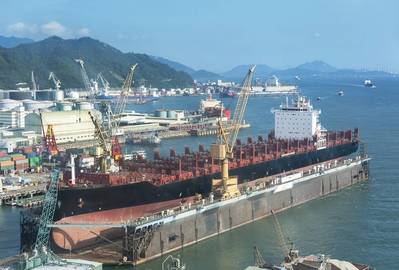How Is Containership Demand Impacting the Hull Coating Business?
Nippon Paint Marine said it is seeing liner operators increasingly postpone dry dockings as they look to keep vessels operational to meet the recent surge in demand for container shipments.
“Containership owners want to push dry docking schedules as much as possible because of the high freight rates and capacity shortage,” explained John Drew, Director, Nippon Paint Marine (Europe). “Although the shipowner’s classification society has the final say in accepting any plans to postpone a five-year dry-docking, we are beginning to see deferments of several months.”
According to the coatings’ manufacturer, the marine coating division of Japan’s Nippon Paint Group, postponed dry-dockings could possibly impair the long-term performance of hull coatings, possibly resulting in increased fouling, fuel consumption and emissions.
Michael Friis, Nippon Paint Marine’s Sales Manager in Denmark, said, “Most coating systems are designed to perform reliably for 60 months. Hull performance needs to be monitored very closely indeed if dry dockings are to be postponed as any commercial gain from a bullish market could be lost."
Drew added, “Hull coatings have a very precise service period calculated at the time of application and based on many variables. As a coatings manufacturer we advise that ship operators follow the application and performance guidelines for coatings designed with a 60-month operating window.”
Nippon Paint Marine also suggested that long delays past the 60-month dry docking life could ultimately result in extra surface preparation requirements when ships eventually do enter dry dock.
“In the worst case, the hull may need to be blasted. This can add to the vessel’s in-dock time and will be more costly. There is also the environmental aspect to consider,” Drew said.
Some major operators set to dock ships at yards in China during January and February have deferred their plans until market demand abates, apparently creating empty slots at the yards.
“If further dry dockings are postponed this year, there could be repair yard capacity issues later when the market readjusts,” Drew said. “Any major changes to the sector’s current dry docking schedules are likely to have commercial repercussions later, possibly for both yard and owner.”















